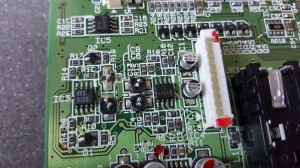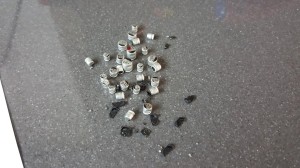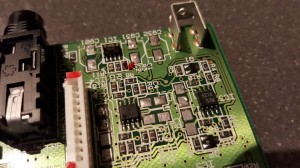Right. The XP-50. I bought this one a few months ago. The problem with this one is that it only produces a loud static noise.. powers up just fine and the display also works fine. Time to open it up 🙂 Because XP-50’s are prone to failure there is a lot of information available online. The display seems to be the biggest issue but there are numerous problems that all boil down to this: leaking capacitors. The XP-50 is 20 years old and the mainboard contains 27 electrolytic SMD capacitors that unfortunately go bad over time. They cause all kinds of problems and the display is normally the first part that stops working. When that happens the display will light up (orange) just fine but it won’t display text anymore. This is caused by 3 capacitors that are broken in that case. Other problems are no sound or distorted sound etc. There seems to be a pretty high succes rate when you replace all 27 capacitors so I though I give that a try 🙂 I opened up the XP-50 and disconnected all the wires so that I could take out the mainboard:
The round silver thingies are the culprits:
Since they are SMD parts (surface mounted parts) it means that removing them requires a SMD soldering workstation. Which I don’t have. I’ve read online that twisting them off with a pair of small pliers works fine if you’re carefull so I though I’d give that a try:
Surprise 🙂 they come right off! Very easy. After that carefully remove the black plastic parts that remain on the PCB and then comes the tedious part of desoldering the pins. I could now see that a lot of the capacitors have leaked. This is very difficult to see when the capacitors are still on the board. I removed all the remaining pins from the PCB and then used desoldering wire to remove the old solder. When desoldering a very corroded pin doesn’t work add some fresh solder and it will come off without a problem. After that clean the PCB with q-tips and alcohol to remove any leaked electrolyte.
I’m going to replace the caps with regular through-hole electrolytic capacitors because I can solder those on with a normal soldering iron. I’ll try to finish it next week.
Update june 2nd 2015: I’ve replaced all caps but the problem remains :’) I’ll check some things later..
Update june 8th 2015:
I’ve removed all the new caps and cleaned the PCB again. I also checked all the traces going to and from the pads leading to the caps and I found one open trace. I repaired this and soldered all the caps back on. I reinstalled the mainboard and switched the XP-50 on: still the same problem :’) Only loud crispering static noise.. I’m not going to be able to fix this. I’ll probably sell it for parts or as a ‘for parts’ XP-50…
I have an old worn dirty JV-80 waiting for some desperate TLC in the attic. Moving on 🙂












Contact me via email and we can take a look at the synth, I’ve been recently working on some Rolands and Im sure there must be a fix for your unit. Cheers!!
LikeLike
Need help…
I have a xp 50 with alike similar problem..
When I connect audio output jack ( mono-L / Headphone), a loud sticky / buzzy sound come out of amp or speaker. I use to off & on power switch to get rid of the noise but It continues for 5 or 10.. Then it turn into normal for the time use it then.. 😦
What to do, any solution here please???
You can Email to> sharifnewag@gmail.com
Thanks in Advance..
LikeLike
Did u replace the battery?
LikeLike
No i don’t think so. The patches weren’t scrambled so I don’t think it was empty or the problem of the garbled sound..
LikeLike
Hola soy juan raymundo yo tongo un roland xp-50 sefue sonodos no suena nada que puedo acer o es main board no fusiona no tengo idea
LikeLike
Hi Juan,
XP-50’s have a tendency to self-destruct at some point. Mostly due to leaking capacitors. If you have no sound this is probably the case. Sometimes it can be fixed by replacing the capacitors on the mainboard.
Greets, Jorick
LikeLike
Tnx for the offer but I already sold it as a ‘for parts’ unit a while ago..
LikeLike
hello liked your post, you could send me the specifications of the capacitors and the numbers will be replaced I thank my email is robinho-jln@hotmail.com hug
LikeLike
Hi Robson,
You can use these:
14 x 10uF 16V
05 x 47uF 6V
03 x 100uF 6V
02 x 330uF 6v
02 x 0.1uF 50V
01 x 4.7uF 50V
I couldn’t get 6V caps so I used 16V instead of 6V.
Good luck with the repair 🙂
LikeLike
Hello there:
Very interesting post. Do you know if the XP-50 uses the same main board as the XP-60 and 80?
I do not recall, but when I recently examined my XP-60 Main Board, it also works on XP-80.
Does the XP-50 and XP-60 use the same board?
LikeLike
Hi Marc,
I’m not sure but I don’t think so. If you look at this picture:
You can see that the mainboard of my XP-50 says: “XP-50 MAINBOARD ASSY” so the XP-60 probably has a different one. I’ve seen other mainboards like the Roland D-10 where the mainboard says something like “Roland D-10 / D-20 Mainboard”.
Jorick
LikeLike
Did anyone ever figure out how to solve the “loud crispering static noise problem” on the Roland XP-50? Please share with me. Charley chanks@mindspring.com
LikeLike
Cheers. As I was about to start our second set during a gig last weekend, my XP-50 decided to emit a harsh, distorted metallic sound. I power-cycled it to no avail but all its other functions continued and were unaffected so I was able to continue using it as a MIDI master keyboard as it was connected to my E-Mu Proteus 2000 module.
I powered it up again the following day with the fault still evident and yet the day after that, the fault had gone. I tried it again last night and the fault was back so it’s now gone into the repair shop. It’s actually my second XP-50 because my first one developed the well-known no sound/no display text issue too!
LikeLike
Further to this, I got it repaired and later bought a spare just to be on the safe side. Six months ago my main XP declined to boot up at all so I considered it deaded and sold it for £100. I wheeled in my spare and got the dodgy micro-switches under its numeric keys fixed and all was well. I sold it a few weeks ago for £250 and it’s gone to a good home. I put the cash towards a Roland Fantom X6 which turned out to have an output issue to the tune of £190….
LikeLike
Hi everyone, I also had the problem of “loud crispering static noise” and finally I have solved it. First of all I changed all caps but the problem still remained. So I noticed that the noise disappeared when I turned off all the effects (EFX, Chorus, Reverb). So I changed one of the two ICs named LH64256BK-70. To find wich one was damaged I put my soldering iron tip over the two ICs and I found that the problem disappeared. I’ve ordered the IC online and I have repleaced it and now my XP-50 works perfectly!!!
LikeLike
My XP-50 had no output signal except for a ‘static’sound … traced it to 0v at IC4, pin 8.
IC3 pin 8 was +15V so I suspected a dry joint or cracked PCB track between C5 +pin and IC4 pin 8.
I soldered a jumper wire from C5+ to IC4 pin8.
All works well. … for now.
LikeLike
Hi David, nice reply and thanks for the info. Did any of those ICs look really crappy when you did the job? I have noticed the whole cluster of IC1, 3 and 4 were looking pretty tarnished from electrolyte leakage. I’ve replaced all my caps and ordered those 3 ICs as I never thought the acid actually ate through copper that well, until now.
LikeLike
Hello, my xp 50 had the same problem, SOLUTION correctly place the flat cables CN13 and CN12 and place an insulator with a larger surface area (between the plate and the screen)
my email is rus_cu@hotmail.com
greetings from Argentina
LikeLike
Cheers. Like I say, I left my final XP go a while ago with no regrets. If anything the Fantom is like a super-charged XP as the programming system closely resembles that of the XP and JV range. I can recommend the Synth Repair Centre in Park Royal, London for all your tech issues.
LikeLike
Hello, my xp 50 had the same problem of constant noise, the SOLUTION was to correctly place the flat cables CN13 and CN12 and place an insulator with a larger surface than the original (between the plate and the display) must be metallic to eliminate static. To solve the noise problem when touching the keys, what you have to do is replace the capacitors C922 C921 C902 C90 C86 (output R) my email is rus_cu@hotmail.com greetings from Argentina
LikeLike